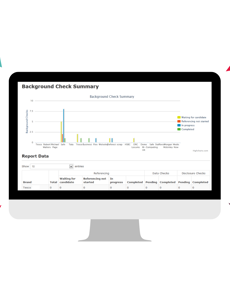 Recruitment Screening
Recruitment Screening
Background screening compliance
At Access Screening, we understand the critical importance of background check compliance within every background screening process.
Our mission is to provide you with compliance tips, tools, knowledge, and resources you need to stay on the right side of the law while making informed and responsible hiring decisions that will successfully impact your business.

What is background screening compliance?
Background check compliance within the background screening process is ensuring your business follows applicable laws, regulations, and ethical standards when conducting background checks on individuals for employment. It is a critical component of the hiring and screening process, ensuring that organisations follow legal and ethical guidelines while evaluating candidates' backgrounds.
Background check compliance is essential to protecting the rights of individuals, maintaining trust in the screening process, and mitigating potential legal risks for employers and organisations.
Additionally, candidate compliance may involve addressing issues related to discrimination and ensuring fairness and consistency in the screening process. By prioritising background screening compliance, organisations can create a level playing field for all candidates, reduce the risk of legal disputes, and uphold their reputation as responsible and trustworthy businesses within their industry.
The importance of ensuring candidate compliance in background screening processes
As you may already know, background screening is an essential part of an organisation’semployment process, as it assists in hiring the right candidates which is crucial to a business' success. However, pre-employment screening checks should be performed carefully to guarantee there can be no legal backlash, which could lead to potential damage to the business down the line.
Take a look at some of the potential repercussions that could take place as a result of non-compliance – not surprisingly, they are all connected in one way or another:
See how to ensure trust with reliable background checks
How is Access Screening helping businesses remain compliant within their screening processes?
Access Screening benefits from many types of checks and features that help to keep in-line with current legislation and ensure your business does not fall victim to hefty fines and reputational damage.
- Before any checks take place, Access Screening requires consent from the candidate through our GDPR agreement.
- Access Screening uses third-party provider Onfido for our Remote ID right to work checks – Onfido are on the governments official IDSP supplier list.
- Our platform can perform pre-employment background checks and rescreening checks, such as DBS checks, referencing and right to work checks.

Compliance resources
Find out more about background screening compliance.

Take a look at Access Screening in action with one of our experts
Our RecOS platform
From software products designed to solve key challenges to a fully integrated solution:
- Providing your recruiters with tools to drive revenue
- Supplying your management with necessary reporting
- Reducing operating costs by building efficient and scalable middle and back-office teams
- Enhancing the digital experience for applicants, workers, and clients
Discover how Access can help your entire recruitment business become more productive and efficient, giving you the freedom to focus on clients and candidates.
















